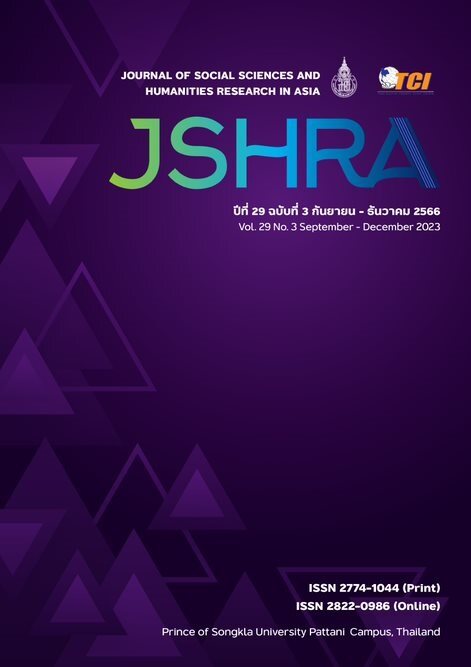Development of a Management Model for Promotion of Health Care Behavior in Diabetic and High Blood Pressure Patients at Risk of Cardiovascular Disease in Nakhon Sawan
Keywords:
Diabetes and Hypertension, Health Promotion Self - Management Model, Risk of cardiovascular diseaseAbstract
This research aimed to develop a management model designed to encourage health-promoting behavior in diabetic and high blood pressure patients at risk of cardiovascular disease in Nakhon Sawan and to investigate the outcomes of the model. A purposive sample of 40 participants was selected. The research tools included a Health Behavior Promotion Activity Manual and four measurement sets; knowledge assessment of health care behavior, perception of conditions at risk of disease, attitude toward health care behavior, and health care behavior. Data analysis involved descriptive statistics. The research findings revealed a model to promote healthy behavior, consisting of the seven following activities: 1) provision of knowledge of diabetes, high blood pressure, and cardiovascular disease, 2) learning activities regarding the impact of the risk factors associated with diabetes and high blood pressure on the development of cardiovascular disease, 3) health care promotion in alignment with nutritional principles, 4) exercises, 5) emotion management, 6) follow-up home visits, and 7) knowledge exchange to promote proper health care behavior. The average values before and after the health behavior promotion activities differed. Improvements were found in 1) knowledge of health care, 2) perception of conditions at risk of disease, 3) attitude toward health behavior, and 4) health care behavior. Furthermore, the average scores after the experiment were significantly higher than those of prior experiment, with a significance level of .05. Regarding the average health outcomes post-experiment, there was a statistically significant decrease in both waist circumference (x̄ = 93.70, S.D. = 8.83 / x̄ = 90.63, S.D. = 8.93) and blood sugar values (x̄ = 128.18, S.D. = 58.03 / x̄ = 111.85, S.D. = 39.39) at the 0.05 significance level. Satisfaction with the overall health behavior promotion management model was rated at a high level (x̄ = 4.06, S.D. = 0.56). When considering all items individually, each received a high rating (x̄ between 3.64 – 4.38, S.D. between 0.48 - 0.66).
References
Bureau of Non - communicable Diseases, Department of Disease Control, Ministry of Public Health. (2016). Evaluation of risk factors for cardiovascular disease in patients with diabetes and hypertension. Nonthaburi: Office of Veterans Affairs Printing Affairs.
Bureau of Non - Communicable Diseases, Department of Disease Control, Ministry of Public Health. (2018). Situation on NCDs prevention and control in Thailand. Nonthaburi: Office of Veterans Affairs Printing Affairs.
Charoenphan, C., & Promarak, T., (2003). Health behavior (5th ed.). Khon Kaen: Klang Nana Wittaya Printing House.
Chukampang, C. (2007). Learning assessment. Mahasarakham: Mahasarakham University.
Chulalongkornhospital. (2021). NCDs. Retrieved March 20, 2022, from https://chulalongkornhospital.go.th/kcmh/line/ncds/
Division of Health Education, Faculty of Medicine Siriraj Hospital Mahidol University. (2020). Non-communicable diseases (NCDs). Retrieved May 21, 2021, from http:// healthydee.moph.go.th/view_article. php?id=908 from www.med.cmu.ac.th/dept/commed/2015/
images/files/.../54723515_home_visit.pdf
Ferguson, G. (1989). Statistical analysis in psychology & education. Tokyo: McGraw - Hill.
Johnson, A. (2008). A short guide to action research. Boston: Pearson.
Kemmis, S., & McTaggart, R. (1990). The action research planner (3rd ed.). Victoria: Deakin University Press.
Krathwohl, D.R., Bloom, B.S., & Masia, B.B. (1964). Taxonomy of educational objectives: The classification of educational goals. Handbook II: The affective domain. New York: David McKay.
Lamaisri, T. (2019). The development of training curriculum to enhance the competency of the administrative officer school under the buengkan primary educational service area (Master of Educational in Administrative Innovation). Sakon Nakhon Rajabhat University.
Lertsakornsiri, M., & Khampunyo, C. (2017). Factors associated with health-promoting behaviors of nursing students at Saint Louis College during practice in the health care service. Naresuan University Journal: Science and Technology, 25(3), 67 - 76.
Loykaew, K., Vorapongsathorn, S., Vorapongsathorn, T., & Chooratna K. (2019). The effectiveness of a health education program applying Pender’s health promotion model on self health-care behavioral modification of patients with type 2 diabetes mellitus in subsub-district health promoting hospital, Bankha District, Ratchaburi Province. Vajira Medical Journal: Journal of Urban Medicine, 63(4), 283 - 296.
Ministry of Public Health. (2021). Diabetic rate high blood pressure coronary heart disease and cerebrovascular disease in the 3rd health service area Nakhon Sawan Province 2021. Retrieved December 1, 2021, from https://hdcservice.moph.go.th/hdc/main/index_pk.php
Namwong, T., Klinchad, R., Rajchaniyom, S., Khapol, P., & Thongpakdee, N. (2519). Development of promoting self-management model among uncontrolled diabetic patients. Nursing Journal of the Ministry of Public Health, 29(3), 179 - 193.
Nanthasukhon, R. (2012). Principles of educational measurement and evaluation (4th ed.). Bangkok: Golden Point.
Nimsuwan, P., Nimsuwan, K., Sripornngam, T., & Choosanook, A. (2017). Influencing factors of dengue hemorrhagic fever prevention behavior of villagers in the community area Nakhon Sawan West District, Amphoe Mueang, Nakhon Sawan Province. Journal of Dhonburi Rajabhat Research for Community Service, 3(2), 146 - 166.
Nitirat, P., Pisaipan, P., Rongmuang, D., & Lekwong, S. (2018). Effects of mixed-theory based model for behavioral modification on the perception toward self-efficacy in self-management and the reduction of chronic disease risks among professional and non -non-professional staffs in Phrapokklao College of Nursing Chanthaburi Thailand. The Journal of Prapokklao Hospital Clinical Medical Education Center, 35(1), 18 - 29.
Onsri, P. (2016). Knowledge attitude and health-promoting behaviors among army nursing students. Journal of The Royal Thai Army Nurses, 17(3), 158 - 167.
Pamulila, S. (2018). Action research. Retrieved May 21, 2021, from http://www.nurse.ubu.ac.th/sub/knowledgedetail/Actionresearch.pdf
Payakwichian, G. (2021). Psycho - social factors correlated health care behaviors in diabetic and high blood pressure patients at risk of cardiovascular disease in the area of Nakhon Sawan Province. Journal of Social Science and Humanities Research in Asia, 27(3), 3 - 42.
Pender, N.J., Murdaugh, C.L., & Parsons, M.A. (2006). Health promotion in nursing practice (5th ed.). New Jersey: Pearson Education, Inc.
Pender, N.J. (1987). Health promotion in nursing practice (2nd ed.). New York: Appleton Century Crofts.
Rungsang, T., Chanthamolee, S., Suwan, P., & Srisuphanunt, M. (2018). Participatory health program for older adults in Angthong Province. The Southern College Network Journal of Nursing and Public Health, 5(2), 30 - 45.
Sirikaensine, S. (2019). Health belief related to blood glucose control among patients with diabetes mellitus type ii in Kut Chik Subdistrict, Mueang District, Nongbua Lamphu Province. Southeast Bangkok Journal, 5(1), 55 - 68.
Srisong, A. (2016). Development of blended training packages on information systems program for teachers of assumption college sriracha (Educational Technology). Burapha University.
Thavornwattanayong, W., (2016). Fundamental knowledge and skills for family pharmacy. Veridian E-Journal, Science and Technology Silpakorn University. 3(4), 44 - 61.
Thongbunjob, K., & Hathirat, S. (2015). Home visit in primary care. Retrieved May 21, 2021, from http://www.med.cmu.ac.th/dept/commed/2015/images/files/pdf/331505/54723515_home_visit.pdf
Uthaiviankul, K. (2018). Self-promoting attitudes affecting the health performance of students in the Institute Physical Education of Bangkok. Journal of the Association of Researchers (Humanities and Social Sciences), 23(2), 178 - 190.










